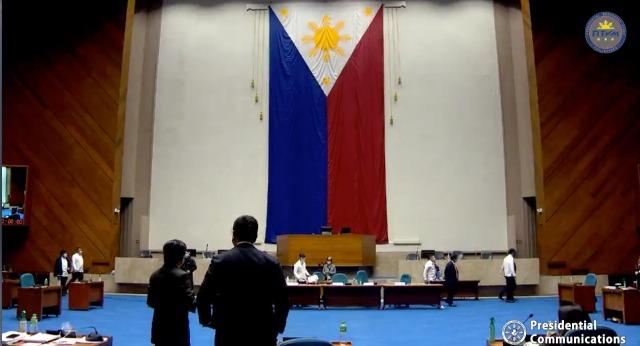House panel adopts reso proposing economic Cha-cha

The House committee on constitutional amendments on Tuesday approved the joint resolution proposing amendments to the "restrictive" economic provisions in the 1987 Constitution.
With a vote of 62 in the affirmative, three in the negative, and three abstentions, the panel approved Speaker Lord Allan Velasco's Resolution of Both Houses (RBH) No. 2, which seeks to amend existing economic provisions in the Constitution in a bid to open up the Philippines to foreign direct investments (FDIs) which could help the country recover from the COVID-19 pandemic.
The panel also subsequently approved its committee report on their deliberations and approval of the measure, which came on the 34th anniversary of the ratification of the 1987 Constitution.
RBH No. 2 inserts the phrase "unless otherwise provided by law" to the constitutional provisions on national economy and patrimony; education, science and technology, arts, culture, and sports; and on general provisions to give Congress flexibility to enact laws that would free up the economy to foreign investors.
The panel, however, excluded from this proposed amendment Article 12, Section 7 pertaining to foreign ownership of land in the Philippines, which states that "no private lands shall be transferred or conveyed except to individuals, corporations, or associations qualified to acquire or hold lands of the public domain."
Velasco has maintained that opening up the country to foreign investors is crucial to help the Philippine economy recover from the impact of the COVID-19 pandemic.
"As global economies slowly start to reopen, we cannot allow the Philippines to lag behind in terms of investments and opportunities. We need to seize the momentum if we are to fully recover from the economic devastation of COVID-19," he said.
"RBH 2 seeks to liberalize the restrictive economic provisions in the Constitution that prevent us from becoming fully competitive with our Asian neighbors," he added.
Meanwhile, House panel chair Alfredo Garbin Jr. said the slight change in the Constitution's language "will improve the investment climate and generate much needed investments and jobs to counteract the economic contraction caused by the pandemic."
Opposition
Bayan Muna party-list Representative Carlos Zarate, however, aired his opposition to the proposed amendments to the economic constitutional provisions.
He commented that even with the protectionist provisions in the Constitution, the Philippine economy is already liberalized.
"We have been saying that we need FDIs. Hindi ko yata matanto 'yan dahil since 1991 when we passed the Foreign Investments Act, our economy has been so liberalized even under this regime of the 1987 Constitution where we have supposed protectionist provisions," Zarate said.
He added that Congress may also pass laws which could further liberalize the economy without the need to amend the Constitution.
In the end, Zarate said the point of amending the economic provisions in the Constitution is to "sell" the country to foreigners.
"The real purpose is really, bigay tayo doon sa dayuhan. 'Yun ang aming pinangangambahan na ito ay talagang magbubukas ng oportunidad, while the other jurisdictions are going back to protectionist regime dahil nga sa nangyayari ngayon na worldwide crisis na pinalala ng pandemya ng COVID," he said.
Garbin, however, disagreed with Zarate's claim that there will be a "wholesale" of the country's national patrimony and economy if the measure is approved.
"The only proposal pending now before this committee is to insert the phrase 'unless otherwise provided by law,'" Garbin said.
"Meaning if this proposal will be approved by the people in a plebiscite called for that purpose, then Congress will have the leeway and flexibility to propose legislation that will respond to the present economic condition," he added.
The chamber is aiming to finish the deliberations on the proposed economic amendments before the end of 2021 and present it to the public for ratification alongside the 2022 elections. —AOL/KG, GMA News



